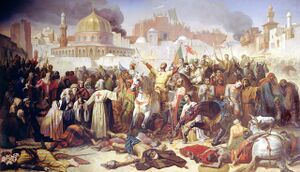First Crusade: Difference between revisions
Notbyzantium (talk | contribs) No edit summary |
|||
| Line 56: | Line 56: | ||
==The Crusade== | ==The Crusade== | ||
====Initiation==== | ====Initiation==== | ||
The Rhomaion Emperor Basil III reached out to Pope Clement IV for assistance by sending several envoys to the Council of Picenza in 1094. Responding favorably, in hopes to mend the schism between western and eastern Christianity through assisting the east in their time of need, the Pope agreed to send military assistance from Latin [[Ventismar]]. He traveled western Ventismar and delivered speeches addressing topics such as the denial of Christian pilgrims' rights to visit the holy lands, the persecution and violent conversions of eastern Christians under Islamic rulers, and the just-war doctrine to rationalize a holy war. Additionally, he added that all who would take arms for the struggle would be guaranteed salvation in heaven. Enthusiastic crowds responded with cries of ''Deus vult!'' ("God wills it!"). This marked the declaration of the first crusade. | |||
====Campaigns in Anatolos==== | ====Campaigns in Anatolos==== | ||
Revision as of 22:46, 16 August 2019
This article is incomplete because it is pending further input from participants, or it is a work-in-progress by one author. Please comment on this article's talk page to share your input, comments and questions. Note: To contribute to this article, you may need to seek help from the author(s) of this page. |
The First Crusade was the first of several crusades against Islamic forces, primarily over control of Serujalem. It was initiated with Rhomaion ambitions to recapture Serujalem along with the denial of Christians to visit the Holy Land by the Ashuyyads. It began with conquests in Anatolos and went on towards the Holy Land, which fell to the Ashuyyads in 1028.
Historical Context
The end of the Rhomaion Golden Ages was marked by the decline of the Rhomaion Empire's power and influence and the rise in power and prestige of rival Empires in the Latin west. A mild internal crisis made defending the Empire's eastern edges difficult, which were quickly lost to Islamic advances. The Rhomaion Empire lost control of the Holy Land in 1028. Unlike the previous fall of Serujalem from Rhomaion rule in the 8th century, the Rhomaions were unable to recapture it and were substantially out-rivaled in military capacity. Soon, the Ashuyyads began denying Christian pilgrims their ability to visit the Holy Lands in 1093. Angering both western and eastern Christians, the stage was set for a holy war.
The Crusade
Initiation
The Rhomaion Emperor Basil III reached out to Pope Clement IV for assistance by sending several envoys to the Council of Picenza in 1094. Responding favorably, in hopes to mend the schism between western and eastern Christianity through assisting the east in their time of need, the Pope agreed to send military assistance from Latin Ventismar. He traveled western Ventismar and delivered speeches addressing topics such as the denial of Christian pilgrims' rights to visit the holy lands, the persecution and violent conversions of eastern Christians under Islamic rulers, and the just-war doctrine to rationalize a holy war. Additionally, he added that all who would take arms for the struggle would be guaranteed salvation in heaven. Enthusiastic crowds responded with cries of Deus vult! ("God wills it!"). This marked the declaration of the first crusade.
Campaigns in Anatolos
Once western crusaders reached the gates of Constantinople in April 14th, 1095, Basil III officially declared war against the Ashuyyads. The vast numbers of the crusaders overwhelmed Ashuyyad defenses and quickly restored those lands to Rhomaion rule.
Continued march to Serujalem
The crusaders quickly proceded down the coast of Centismar and encountered little resistance due to their size. The governor of Serujalem, Thaamir al-Rabbani, began expelling Christians from the holy land and surrounding territories to avoid resistance from treason. Most of them resettled in Rhomaion-ruled areas of Anatolos.
